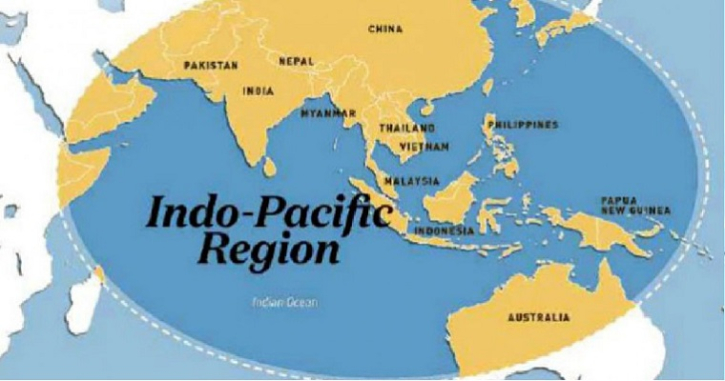
Photo: collected
The Indo-Pacific, like every other geostrategic space, is imagined with apparent disagreements or passively lacks agreements on the components that comprise of this space. Depending on who is responding to the issue, this space would include and/or exclude certain countries from its perceived boundary that also varies depending on whose imagination is constructing this space. It is the resulting construct of the Asian continent becoming the center of gravity for the world’s economy.
The global geoeconomic eastward shift resulted in the Indo-Pacific being regarded as an integrated construct where great geoeconomic opportunities are rife with burgeoning security challenges everyone. The Indo-Pacific is the future of global economy, and every country, including those in the west want to be part of its future dividends. Thus, we are seeing several Indo-Pacific Strategies being offered.
This Indo-Pacific construct is then truly a derivative of security and geoeconomic interests, challenges, and priorities; and prior to this concept, the two oceans were bifurcated due to diverging geopolitical mindsets of the global powers post WWII. Pacific Ocean space, previously referred to as the Asia-Pacific region, constituted a unique geopolitical theatre of cooperation, conflict and war. It was also a launchpad for several initiatives like APEC and UNSCAP. Until late 2000s, the geopolitical focus of the west was mainly constrained to the Euro-Atlantic, principally occupied with Russia and the Middle-East. The regional power dynamics is now altered with the rise of China including India and the ASEAN countries, incentivizing the conceptual transition of the Asia-Pacific construct to the Indo-Pacific space. Push for recognition of this new construction has mainly come from the US, Japan, Australia, India, and Europe who hope to create multi geopolitical poles to undermine the emerging Sino-US bipolarity.
The aforementioned was reiterated in a seminar organized on August 28. The Center for Peace Studies (CPS) of the SIPG of NSU organized the discussion to identify the areas in which Bangladesh can gain economic benefits from the potential advantages, and opportunities that various IPS offers. In the course of the discussion, there were a number of areas and key avenues that were underscored by the discussants that need immediate and in-depth attention, holistic goal-based policy, objective-based planning, and functional and adaptive implementation in order for Bangladesh to gain the leverage from the IPS of any country on the table.
The US IPS offers advantages through its economic framework, while the Canadian IPS offers opportunities to tap into through the commitment made in the IPS of investing 230 billion CAD in this region in various areas of priority for Canada. As the discussion underscored, and the geopolitical reality in the previous several months has signified, the IPS, whether it be of Canada, the US, Japan, or India, it is now geopolitical reality that Bangladesh has to deal with and address in the coming future. Although IPS has incurred a plethora of concerns about its strategic implications for countries like Bangladesh, the IPS also offer many economic advantages if Bangladesh, and countries as such, can effectively maneuver the geopolitics that come along with it.
One thing should be mentioned that none of the IPS put forth by several global players has Bangladesh mentioned as a country of priority, whereas, India, South Korea, ASEAN, even Africa get special mention in every IPS or the other. Irrespective, Bangladesh remains a country of interest for all. As the discussion underscored, the supply routes in the Indian Ocean remain ineffective if the Bay of Bengal remains excluded, and Bangladesh is positioned as the central littoral country to the Bay of Bengal. With key efforts from Bangladesh, the Bay of Bengal is currently the only sea trade route in the world that is undisputed. There are also 13 major sea ports in the Bay four of which are on the Bangladeshi shores. In spite of such geographic and infrastructure advantages, we seem to lag clear plan and strategy on how to leverage this.
As one of the discussants in the event, a businessman belonging to both Bangladesh and Canadian business communities rightly identified that Bangladesh is yet to take any effective action in diversifying its export basket nor any of the industries in Bangladesh built a reliable backward linkage; in spite of all of us including the government talking about need for this for more than a decade, at least. Every IPS offers some or major opportunities for both Bangladesh and the respective country to take advantage of this position to strengthen potential partnerships in business, investments and trade to complement each other. The discussant underscored that the government has mostly identified the right local business groups or enterprises that can bring in or generate interest from investors or can invest themselves in sectors of priority. This is evident from the list of private sector enterprises that got licenses for specialized economic zones. Additionally, government has also implemented with the right approach to modernization, focusing towards hi-tech services and declaring the vision of digital, and now smart Bangladesh. It is also working towards relevant training, hi-tech park establishments, tax breaks and export incentives. Also, manufacturing needs to be strengthened and such many EPZ economic zones has been planned, some started operating, some underway. Bangladesh understands that we need to move towards hi-tech and industrial production that would yield higher value additions and margins for Bangladeshi exports, in order to Bangladesh towards a middle income country.
But, Bangladesh still lags greatly behind in the ease of doing business index remaining in the lowest percentile at best. As the government has focused on ICT through software and hi-tech manufacturing, it also needs strongly supporting sectors such as light engineering, pharmaceuticals, and even agriculture, where modernization, product marketing, product diversification, and others areas need improvement. The IPS being offered can provide for avenues to Bangladesh for partnering with the respective countries. These partnerships can range from transferring of technical know-how to helping Bangladesh market its productions to new and potential markets. And these need to be led by the private sector, with least amount of bureaucratic hassles. These efforts will be driven through private-private partnership or public private partnership. Bangladesh needs to ensure this to leverage its position.
The other aspect that needs special focus for Bangladesh to tap in to the IPS offered privileges is the financial compliance and governance in Bangladesh. FDI is an important component for inflow of forex. If Bangladesh aligns its actions, guided by its Indo-Pacific Outlook, correctly, it can open create a win-win and increase FDI to Bangladesh. As the banker from a multinational bank in the panel of the event rightly pointed out, FDI along with trade will strengthen Bangladesh’s position helping to graduate from LDC. Countries like Canada that are proposing their IPS, can bring in their expertise in governance, sustainability, efficiency (green), and help improve sourcing of finished goods as well as share technical and skill development assistance (education, training, prudent and accurate data reporting.)
A project or initiative is successful only when all the stakeholders (not only G2G) are engaged and policy is formed aligning with reality. EPZ (under Bepza) was successful as all the stakeholders worked on a common goal and regulations were made according to it. Infrastructure and logistics (utility) were provided in a timely manner. Special Economic Zones have not reached their potential as infrastructure and logistics are not yet there. One example of success in this case for Bangladesh would be the agriculture sector, although there are still a plethora of areas to improve in this industry. Bangladesh Bank’s agriculture policy has been successful as it adapted continually to needs and ensured that farmers receive funds and can benefit from other supports. Also insurance market can be a supportive way of increasing saving as a whole which can be used as a tool to boost investable funds. Whatever initiatives are taken this has to have a sustainable financing model. Dependency only on foreign funds will have initial traction but will not have a longer and sustainable impact. This should also be included in government approach to leverage all that is offered by all the IPS.
Bangladesh needs to establish a framework as soon as possible to create an economic strategic depth that would help the country avail the economic benefits of the respective IPS. Through these initiatives, Bangladesh will not only gain the ability to leverage the economic benefits offered by the several IPS that have already been proposed and declared, but also gain strategic autonomy to remain neutral in the geopolitical quagmire that the Indo-Pacific Strategies bring along with them.
Finally, as Professor Imtiaz Ahmed of Dhaka University, one of the panelists, pointed out that the evolving multipolar nature of geopolitics is unavoidable, especially in this age of globalization. The globalized nature of culture, supply chain, information, and production has made this evolving multipolarity inevitable. He also underscores that this multipolarity will have a fluid nature, with shifting gravity, axis of influence, and alliances based on the context, area, and respective interests of relevant countries. Professor Imtiaz strongly underscored that Bangladesh’s education system needs to evolve allowing for knowledge and skillset that help the Bangladeshi human resource to adapt to global economy and its curvatures. It must cater to the local needs of building a large of middle managers that Bangladesh lacks. These along the aforementioned efforts only can ensure the strategic autonomy that Bangladesh needs to sustain the geopolitical pressures, and geostrategic dispersion of the Indo-Pacific realities, and be able to attain its geoeconomic objectives, and those offered by the IPS with little challenge.
The writer is Political and International Affairs Analyst.

.png)







